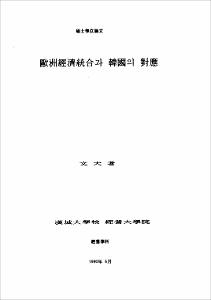歐洲經濟統合과 韓國의 對應
= (The) EC full economic integration and the direction of the policy of Korea
- Files in This Item:
-
-
Download
 000000066310.pdf
기타 데이터 / 2.11 MB / Adobe PDF
000000066310.pdf
기타 데이터 / 2.11 MB / Adobe PDF
-
Items in Repository are protected by copyright, with all rights reserved, unless otherwise indicated.